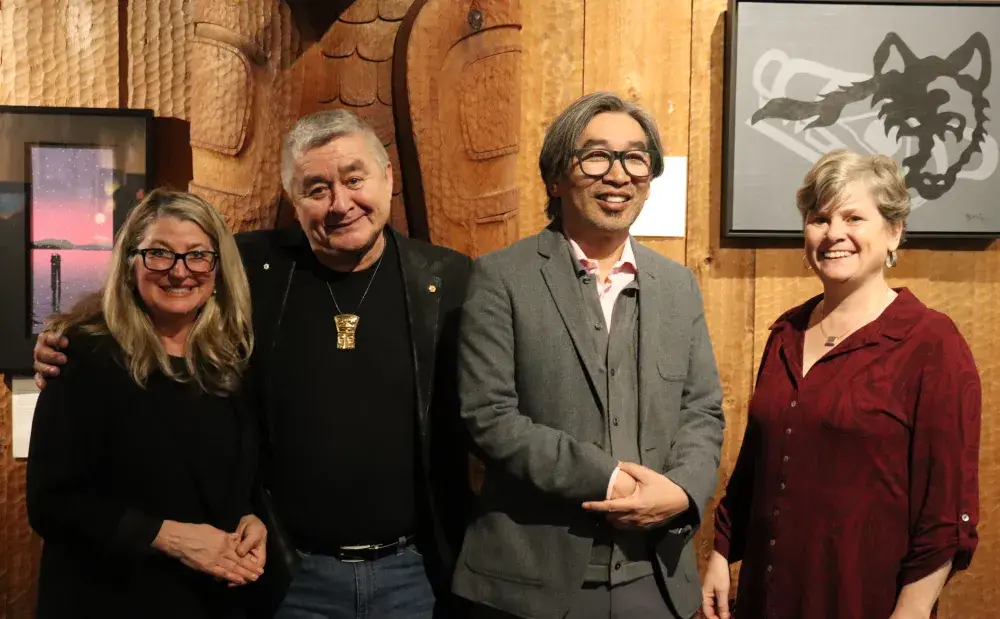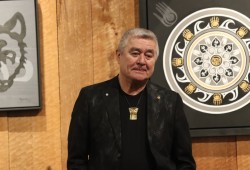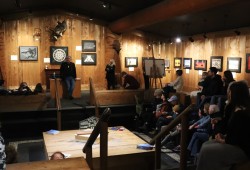A crowd gathered in Roy Henry Vickers gallery, which has been on Tofino’s Campbell Street since 1986, as the B.C. Art Council announced the world-renowned Tsimshian, Haida and Heiltsuk artist as the inaugural elder-in-residence.
“I am so proud and moved to be able to announce that this great person here will be the first new elder-in-residence role at the BC Arts Council,” announced Lana Popham, minister of Tourism Arts, Culture, and Sport, to the group of people gathered.
Vickers’ role as elder-in-residence will not only provide an Indigenous voice to the B.C. arts council, but also give mentorship opportunities for First Nations artists.
“He's a designer, he's a carver, he's a writer, he's a printmaker, he's an artist, he has a lot to offer,” said Sae-Hoon Stan Chung, chair of the BC Arts Council. “Particularly those mid-career youth artists who want to figure out how to enter the market [and] how to stay in the market.”
But it’s not always about the market and “success in traditional terms”, shared Chung.
“He wants to understand where you are as an artist, and help you develop in a way that you want to develop,” said Chung.
Chung goes on to share that Vickers is the first Indigenous artist in Canada to own his own gallery. He hopes that Vickers’ mentorship can help guide Indigenous artists to have similar ownership of their art.
Before Vickers started his journey as elder-in-residence, he significantly impacted the B.C. Arts Council through his involvement from July 2019 to January 2023.
Through suggestions from Vickers, BC Art Council meetings shifted to include more relevant topics and approaches to Indigenous artists, shared Chung to the audience. Vickers’ input even resulted in changes to the organization’s policies to focus on relationships.
Mentorship will be accessible through funding mechanisms, said Chung. He noted that there will be funding opportunities for youth to travel to conferences and festivals where Vickers will be featured as a speaker.
“It supports truth by listening to elders, like myself, who have grown up and know the land,” said Vickers, when asked how this role supports truth and reconciliation.
“I’m glad that I’ll have the elders voice to do this,” he said, noting how arts, culture, healing, and the environment holds a place close to his heart. “It’s one of the biggest honors of my career.”
Vickers, said Chung, represents the wisdom and knowledge needed to heal.
For the BC Arts Council, recognizing the harmful impacts of funding systems that excluded Indigenous people is a part of truth and reconciliation, shared Chung.
“We want to show Indigenous communities that we're serious about truth and reconciliation, and we're serious about saying, ‘Sorry, we didn't get this right in the past, but we're trying to do things differently now’,” he said.
“One of the things that we're doing is making sure that Indigenous elders have a chance to affect Indigenous youth and Indigenous communities with the appropriate roles,” said Chung.
"I'm proud to be the first Elder-in-Residence for the BC Arts Council," said Vickers in a press release. "This role allows me to serve both my local community and the larger arts community. I'm looking forward to sharing my perspectives and stories and working with the council to support artists across the province."
“A real part of truth is to recognize the harmful parts of funding systems, where Indigenous people haven't been involved them been a part of the decision making, and they haven't felt like the door was open to them,” said Chung.



